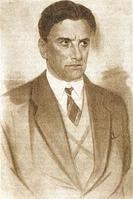| Vladimir Vladimirovich Mayakovsky | |||||
| 弗拉基米爾·弗拉基米羅維奇·馬雅可夫斯基 | |||||
阅读馬雅可夫斯基 Vladimir Mayakovsky在诗海的作品!!! | |||||
著名的俄國詩人,出生在格魯吉亞山區的巴格達吉村的一個林務官的家庭。他童年時代就喜歡文學。1906年隨全家遷居莫斯科,不久即開始從事革命活動。
1911年,馬雅可夫斯基進入莫斯科繪畫雕刻建築學校,開始寫詩,早期詩歌具有未來派的色彩。長詩《穿褲子的》(1915)是-部愛情詩,但其基調是批判資本主義。
十月革命,馬雅可夫斯基的創作進入一個新時期。他寫出短詩《我們的進行麯》(1917)、《革命頌》(1918)和《左進行麯》(1918), 以及劇本《宗教滑稽劇》(1918)和長詩《一億五萬》(1921)等許多歌頌革命的作品。1919年至1922年期間,馬雅可夫斯基為俄羅斯電訊社的"羅斯塔之窗"工作,他作的詩畫題材泛,簡潔鮮明,頗受群衆歡迎。他的諷刺詩《開會迷》(1922)辛辣地諷刺官僚主義和文牘主義。
1924年以,他的創作進入成熟期,先受不了長詩《列寧》(1925)和《好!》 (1927),長詩序麯《放開喉嚨歌唱》(1930),諷刺喜劇《臭》(1928)和《澡堂》(1929),以及美國組詩和特寫《我現美洲》等。長詩《列寧》從正面描寫列寧的光輝一生,描寫群衆對列寧的深厚感情。他的喜劇諷刺小市民及揭露官僚主義,在戲劇藝上有創新。
由於長期受到宗派主義的打擊,加上愛情遭遇的挫,詩人開槍自殺,身留下13詩文
Vladimir Vladimirovich Mayakovsky (/ˌmɑːjəˈkɔːfski, -ˈkɒf-/; Russian: Влади́мир Влади́мирович Маяко́вский; 19 July [O.S. 7 July] 1893 – 14 April 1930) was a Soviet poet, playwright, artist, and actor.
During his early, pre-Revolution period leading into 1917, Mayakovsky became renowned as a prominent figure of the Russian Futurist movement, being among the signers of the Futurist manifesto, A Slap in the Face of Public Taste (1913), and writing such poems as "A Cloud in Trousers" (1915) and "Backbone Flute" (1916). Mayakovsky produced a large and diverse body of work during the course of his career: he wrote poems, wrote and directed plays, appeared in films, edited the art journal LEF, and created agitprop posters in support of the Communist Party during the Russian Civil War. Though Mayakovsky's work regularly demonstrated ideological and patriotic support for the ideology of the Communist Party and a strong admiration of Vladimir Lenin, Mayakovsky's relationship with the Soviet state was always complex and often tumultuous. Mayakovsky often found himself engaged in confrontation with the increasing involvement of the Soviet State in cultural censorship and the development of the State doctrine of Socialist realism. Works that contained criticism or satire of aspects of the Soviet system, such as the poem "Talking With the Taxman About Poetry" (1926), and the plays The Bedbug (1929) and The Bathhouse (1929), were met with scorn by the Soviet state and literary establishment.
In 1930 Mayakovsky committed suicide. Even after death his relationship with the Soviet state remained unsteady. Though Mayakovsky had previously been harshly criticized by Soviet governmental bodies such as the Russian Association of Proletarian Writers (RAPP), Premier Joseph Stalin described Mayakovsky after his death as "the best and the most talented poet of our Soviet epoch."
